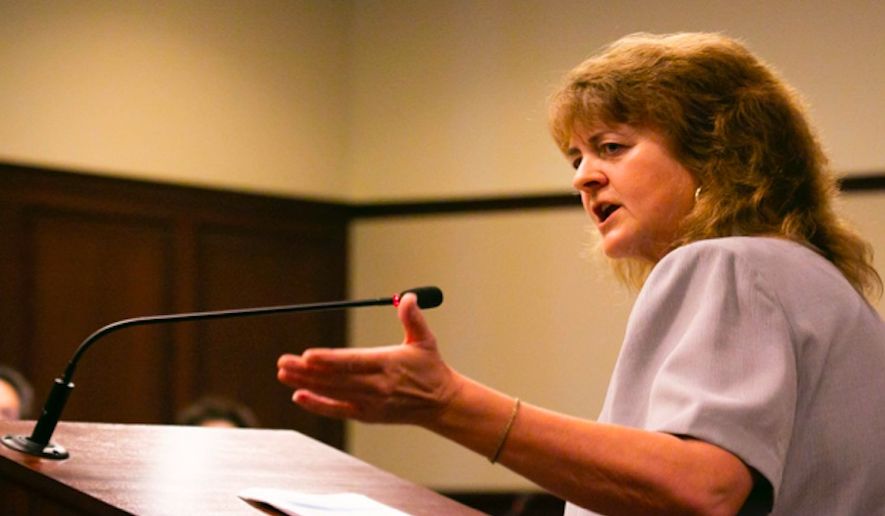Idaho state Rep. Barbara Ehardt played basketball at Idaho State University and went on to coach on Division I women’s teams, but her career might have been over before it started if she had been forced to compete against transgender athletes.
That’s why House Bill 500 wasn’t just policy for her — it was personal.
The legislation signed Monday by Gov. Brad Little made Idaho the first state in the nation to prohibit athletes born male from participating in girls’ and women’s sports at public schools and universities.
Even as a driven, athletically gifted 5-foot-9 point guard, Ms. Ehardt said that “if I had had to compete against biological boys and men, I don’t think I would have had the opportunity to play.”
“Honestly, I know firsthand that we simply can’t compete against the inherent physiological and scientifically proven advantages that boys and men possess,” said Ms. Ehardt, the bill’s sponsor. “We simply can’t do it, regardless of any hormone usage.”
In addition to HB 500, named the Fairness in Women’s Sports Act, the Republican governor signed a bill making it more difficult to change the sex designation on a birth certificate, placing Idaho at the center of a transgender-rights maelstrom.
The Human Rights Campaign said “Idaho is leading the way in anti-transgender discrimination,” while the Southern Poverty Law Center called the laws “another cruel attempt to deny the existence of transgender people.”
Nobody doubts litigation will follow. Lambda Legal is expected to challenge the birth-certificate law in court after winning a similar case in 2018, while the American Civil Liberties Union vowed Tuesday to bring a court challenge the measure on transgender athletes.
“To kick girls and young women out of sports teams because they’re trans or intersex is discrimination and it’s unacceptable,” said Gabriel Arkles, staff attorney for the ACLU LGBT & HIV Project. “Trans and intersex girls participating in sports hurts no one, any more than any other girls participating in sports hurts anyone.”
Lindsay Cox, a freshman at Boise State University and transgender track athlete from California, said she would have no advantage over other women on the team after undergoing hormone therapy to lower her testosterone levels.
“There’s no conclusive evidence right now that anything other than hormone levels will change athletic performance,” Ms. Cox said on a press call, adding that didn’t want to “take away girls’ scholarships or trophies or places. I just want to be one of them, I am one of them.”
Ms. Ehardt disagreed, arguing that transgender women still have physiological advantages, even if their testosterone is reduced.
“You will never compensate for the larger stature, the longer limbs, the denser bones, the larger heart, the larger lungs, the ability to carry more hemoglobin, which of course carries oxygen, and on and on and on,” she said.
’Bigger, stronger, faster’
During her Division I coaching days, she said she would often recruit male players from the intramural level on practice squads to challenge her women’s teams. Even though some of the men had never played in high school, she said they still had to be told to tone down their game when going up against women.
“They were just physically bigger, stronger, faster,” said Ms. Ehardt, a Republican from Idaho Falls who now coaches a boys’ travel team.
Under the law, a student’s health care provider may verify the biological sex as part of a routine sports physical, but foes said the measure would open up students to possibly frivolous challenges and require them to undergo “invasive” examinations or DNA and testosterone testing.
Critics also have raised concerns about Idaho becoming the next North Carolina. After North Carolina passed a transgender bathroom bill in 2016, the state became the target of an economic boycott, including losing the NBA All-Star Game, until the law was eased.
In a statement, Democratic state Rep. Lauren Necochea said she was “disgusted and disappointed that Governor Little has decided to waste valuable taxpayer money to fight court battles over issues that are not a priority to Idahoans.”
Ms. Ehardt said her bill would benefit the state: “I believe Idaho will thrive.”
As for the lawsuits, she said she was more concerned about the lawsuits that would inevitably follow without the change to the state law, given the anticipated increase in the number of transgender girls seeking to play girls’ sports.
“When the ACLU threatened the committees that there would be lawsuits, I completely agreed,” she said. “But let me share with you from where those suits will be coming. They will be brought by the parents of the girls and women whose spots were taken by biological boys and men.”
A group of female high-school track athletes from Connecticut has filed a lawsuit against the state to prevent transgender girls from competing in girls’ sports, arguing that they have been denied championships and potential scholarship opportunities.
“I am so happy that female athletes in Idaho will not have to face an unfair playing field as I have in Connecticut,” said Chelsea Mitchell, one of the Connecticut plaintiffs, in a statement. “I have lost four state championships because my state’s policy ignores the physical advantages males have over females in sports and allows males to compete in the girls’ category.”
Also in Idaho’s corner was the Women’s Liberation Front, a feminist group that opposes transgender athletes playing women’s sports.
“You can’t have both self-identification of sex and also protect sports for girls and women,” the group said in a statement. “Our thanks to the lawmakers of Idaho who chose to stand with girls and women on this count.”
Similar legislation was introduced this year in a dozen other states, but only Idaho moved the bill quickly enough to see it signed as states shortened their legislative session in reaction to the novel coronavirus pandemic.
• Valerie Richardson can be reached at vrichardson@washingtontimes.com.




Please read our comment policy before commenting.